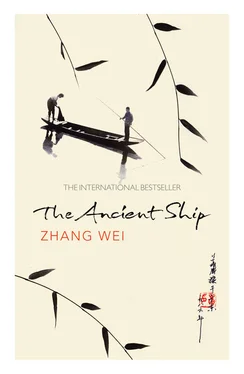Baopu took Jiansu home and went looking for his uncle. He was nowhere to be found. Then when they were crossing the path they heard weeping inside. It was, they discovered, Hanzhang, so they rushed in to see what was wrong. Their sister was lying on the kang crying. Taken aback by the sight, they asked why she was crying. She pointed to the stable. They ran outside and went to the stable, where they saw that the old chestnut was dead. Their uncle was there, too, trembling uncontrollably and muttering something incomprehensible at the dead horse. Baopu knew instinctively that his uncle had planned to ride the horse to report the finding. But now he couldn’t. Baopu and Jiansu fell to their knees at the horse’s side.
Eventually, people at the provincial capital sent a team of experts to remove the old ship, and the residents of Wali never saw it again.
Many years before the old ship was excavated, that is, the spring after Sui Yingzhi died, his second wife, Huizi, followed him in death. The impressive main house of the family estate burned to the ground that day, incinerating Huizi amid the cinders on the kang, a sight too gruesome to behold. Baopu, the only witness, secretly buried her. Jiansu would later ask how she had died, and Baopu would reply that she had taken poison, which was true. But there were many things he did not reveal to his younger brother. Now that the main house was gone, the foundation had been converted into a vegetable garden tended by the two brothers and their sister. Late at night, moonbeams cast their light on the bean trellises, from which crystalline drops of dew fell to the ground.
Baopu recalled how, six months after his father died, Sui Buzhao came to see Huizi. “Sister-in-law,” he said, “I think you should move out of the family home.” She said no. “Now that my brother has passed on,” he said, “you don’t have the good fortune to hold off the evil tied up in this house.” But she ignored him. Several days passed before Buzhao, his face beet red, his body trembling, returned. “Huizi!” he called out after barging into the house. “Huizi!” He fidgeted with his clothes. When she came out and saw him, her surprise was mixed with annoyance.
“What do you want?”
He pointed outside. “My room out there is neat and tidy. I even sprayed perfume on the floor.” She just stared at him, not sure what he was getting at. His chin quivered, and he blinked nervously. Finally, with a stomp of his foot, he said, “Come live with this wretched man, what do you say?” Hardly able to believe her ears, she reached out and slapped him, giving him a bloody nose. “I mean it, you should come with me,” he said, biting his lip. He was obviously not going to be easily put off, so she picked up a pair of scissors. He turned and fled.
“I’m afraid there’s no future for your stepmother,” Buzhao said to Baopu. “She tried to stab me with scissors. Instead of thanking me for my kindness, she treats me like a stranger. I’ve been a useless vagabond all my life, but I’ve never had an indecent thought where she is concerned. I may be dirt poor, but I don’t owe anyone a cent, just what she needs to get through life. Well, to hell with her! She’s never gone to sea, never seen the world. There are plenty of women down south who have moved in with their brothers-in-law after losing their husbands. But, like I say, to hell with her! She has no future!”
Sui Buzhao left and never again entered the main house as long as Huizi was alive. Before long his prediction came true. Some people came to drive her out of the house, which they said now belonged to the town. Baopu urged his stepmother to move, but she set her jaw and refused. She didn’t say a word; she just refused to move. In the end she sent the three children over to side rooms, leaving her alone in that big house. Seeing how stubborn she could be, her brow creased in an expression of strength and hostility, Baopu was reminded of how she had injured her hand by pounding on the table after his father had returned from paying off debts.
After Huizi died along with the main house, militiamen kept watch over Baopu and his siblings for a long time before letting them be. All this time Zhao Duoduo led a team of people in searching the site for hidden treasure, poking the ground with metal poles. To their enormous disappointment they came up empty.
Now that the side buildings were occupied by the brothers and their sister, Sui Buzhao often came over to where the main house had stood. Baopu tried to talk him into moving back into the compound, but he said no. So the three children occupied one of the buildings and used the others for storage. Few books were left from their library, but as political ill winds began to blow, Baopu hid what few remained in a casket. As Hanzhang grew older she more and more closely resembled her mother, but she had the temperament of her father. She moved into one of the other side rooms to be alone.
Around the time of Sui Yingzhi’s death the people who had worked for the family left, all but Guigui, who had nowhere to go. When she wasn’t cooking for the brothers and their sister she sat in the doorway of one of the buildings shelling beans. She was three years younger than Baopu, with whom she’d bathed together when they were both children. Now when she shelled beans she often looked over at him and blushed. One night, after the brothers had fallen asleep, Guigui saw that the lantern was still lit, so she went into their room; she stopped when she noticed Baopu’s muscular shoulders as he lay asleep in the red light of the room. One of his legs was sticking out from under the quilt. She had never seen so much of him uncovered. Worried that he might catch cold, she covered his legs and then his shoulders. The smell of his naked body brought tears to her eyes. She dried her eyes, but the tears kept coming. Then she bent down and kissed his shoulder. He was sleeping so soundly he did not wake up. But Jiansu did, in time to see Guigui bending over his brother’s shoulder. He sat up to see what she was doing. Only half awake, he mumbled, “Hm?” Guigui stopped and ran out of the room. Suddenly wide awake, unable to go back to sleep, Jiansu blew out the lantern and lay there smiling.
From that night on, Jiansu was always on the lookout for contact between Guigui and Baopu, and he discovered that she was actually quite pretty, while his brother was a very strong man. He could have his way with her any time he wanted. A year passed and Baopu and Guigui were married, forcing Jiansu to move into a room by himself, one next to the eastern wall. From then on he could not escape the feeling that his brother’s room was filled with mystery, and he sometimes went in to see what he could see. Guigui had stuck one of her paper-cuts over the window—a crab with a date in one of its claws. The place had a different smell, not sweet and fragrant, but warm. It was a wonderful room.
Jiansu’s own room, cold and forbidding, was only a place to sleep. Most of the time he spent with his uncle, who captivated him with tales of strange things, especially those from his seafaring days, so exciting Jiansu that he listened with his mouth hanging slack. Sometimes he went into the woods to walk aimlessly, searching the trees for birds and daydreaming. As time went on, he could no longer do that; he was like an ox in a halter, tied to a plow with no fun to be had anywhere. He and his brother worked the fields all day long, where he suffered cuts from hoes and scythes and bled like a sapling. His blood was fresh, new, bright red. Scars appeared all over his body as he grew strong from the hard work.
On one occasion the team leader sent him down to the riverbank to cut brambles for a fence. When he got there he spotted a girl of sixteen or seventeen who was also cutting brambles, and when she called him Brother Jiansu, he had to laugh. I’m a brother, all right, he was thinking, one who’s looking for a girl just like you. Hot blood that had flowed through his veins all those years suddenly pooled in his throat, and it burned. Although he barely spoke to her, he kept looking over. As a lively, cheerful girl, she’d have loved to talk to him, but he refused to give her the opportunity. What he wanted was to squelch her cheerfulness and turn her into a different kind of girl. The second day passed the same way, and then the third. On the fourth day, as he was once again cutting brambles, he had a perverse desire to chop off his own hand. At about midafternoon, Jiansu shouted to her, “Look, a thorn pricked my hand!”
Читать дальше












